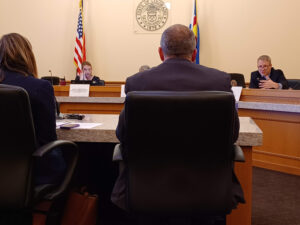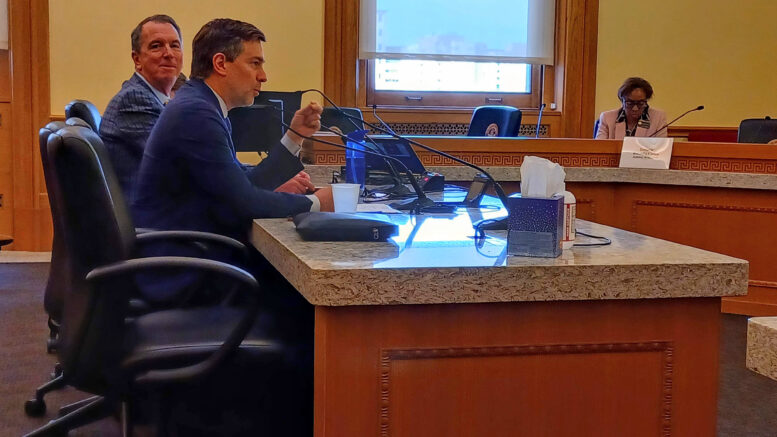Even as Colorado legislators continue to have significant differences on how to deal with issues ranging from housing to health care, they are coalescing around two bills aimed to upskill tens of thousands of state residents and get them into needed jobs before the end of next year.
Following a Senate committee hearing Monday afternoon, both of this legislative session’s primary workforce-development bills have cleared their first hurdles with wide bipartisan support. And the proposed $38.5 billion state budget that is expected to pass its second chamber this week has a $70 million placeholder that will allow the new programs to get full funding — and quickly.
The larger of the two efforts is House Bill 1246 — sponsored by House Speaker Julie McCluskie, D-Dillon, and Assistant House Minority Leader Rose Pugliese, R-Colorado Springs — that puts $40 million in aid toward students seeking in-demand degrees. That can cover the full cost of tuition, fees and books — and, in some cases, help with housing and transportation costs — and go toward degrees, certificates and apprenticeships in nursing, construction, early-childhood education, elementary education, forestry, firefighting and law enforcement.
Running in concert with it is Senate Bill 205, sponsored by Democratic Sen. Jeff Bridges of Greenwood Village and Republican Senate Minority Leader Paul Lundeen of Monument, which will offer roughly $21 million in scholarships for the high-school graduating class of 2023-24. Available in maximum $1,500 awards, those too are prioritized for students seeking careers in in-demand pathways, and they’re meant to give an immediate jolt to industries experiencing labor shortages via the quick addition of workers with skills to match the needs of job openings.
“No-cost training”
Gov. Jared Polis and a bipartisan group of legislators announced the two pieces of legislation in mid-March and drew attention both locally and nationally, helping to inspire a visit to the Capitol on Monday from First lady Jill Biden to discuss the effort to fill in-demand jobs. In addition to getting support from education groups, the bills have garnered praise from business groups like the Colorado Chamber of Commerce and from trade groups hoping to benefit from them, including the Colorado Contractors Association and Colorado Nurses Association.

Gov. Jared Polis speaks at a news conference in mid-March about two coming workforce-development bills he will support this legislative session.
Such backing stems from business owners’ rising concerns that expansion efforts and even normal operations could be stifled without more workers prepared for in-demand careers, Colorado Chamber Senior Vice President of Governmental relations Meghan Dollar said. And several industry groups offered statistics to back that claim: Denver needs 40,000 to 50,000 more construction workers to meet demand; Larimer and Weld counties have a combined 1,000 open registered nurse positions; there is one licensed early-childhood education slot open for every two kids of that age in the mountains because of a lack of instructors.
“We can bolster efforts to provide no-cost training in specific sectors where Colorado employers have been unable to fill positions,” said Joe Garcia, chancellor of the Colorado Community College System, in testifying for HB 1246 on March 22, noting many open jobs don’t demand bachelor’s degrees. “Those students don’t need four-year degrees, but we need them. And we need them trained. And we need them now.”
Specifics of the bills
HB 1246 will put $38.6 million toward the cost of getting needed degrees and certificates, with state education leaders marketing the opportunities through high schools and through technical colleges that cater to state residents completing their GED high-school equivalency diplomas. It also will put $5 million to the creation of two new short-term nursing-degree programs at community or technical colleges, and it will allot $1.4 million to certified construction apprenticeship programs.
Because the apprenticeship programs typically are offered for free, the money can be used to offset costs for expanding the programs and bringing in more students, said Katherine Keegan, director of the Office of Future Work in the Colorado Department of Labor and Employment. With the number of needed construction workers expected to double as federal Infrastructure Investment and Jobs Act grants go out in the coming years, there is a great need to get more people into those professions and get them trained through the programs while they work.
SB 205 will let students use the $1,500 toward any educational or training path they choose, but the expected 14,000 scholarships it provides will be prioritized for students choosing career paths identified by the Colorado Office of Economic Development and International Trade. Josh Ryken — government and public affairs officer for CrossPurpose, an organization that puts students from under-resourced communities through training programs that lead to jobs, said he expects the effort will grow workers in “middle-skills” jobs that require some post-secondary education but not four-year degrees.
An economic-development issue
OEDIT Executive Director Eve Lieberman said the financial aid aims to reverse the 10% decline in the number of Colorado high-school graduates who sought post-secondary degrees between 2019 and 2020, leaving more people without advanced skills required by employers. Now 50% of graduates don’t seek any advanced degree in the fall after exiting high school, she noted.
While HB 1246 received unanimous support from the House Education Committee and SB 205 passed the Senate Education Committee on a 6-1 vote, the latter bill generated significant questions from Sen. Chris Kolker, a Centennial Democrat and former teacher.

Colorado state Sen. Chris Kolker on Monday questions OEDIT Executive Director Eve Lieberman and Colorado Contractors Association President/CEO Tony Milo about Senate Bill 205.
Kolker said the $4 million in the $25 million bill not going to scholarships — money intended for a vendor contract to provide career-advising services in K-12 schools and to market and oversee the program — represented a missed opportunity to help more students. And he asked why the state needed to launch a new program one year after it launched the $85 million Colorado Opportunity Now initiative that’s in the early stages of doling out grants to business/education partnerships offering new programs to fill jobs in emerging industries where few workers now have the necessary skill sets.
“We’ve so underfunded higher education for so long. And I think colleges and community colleges are thinking they will get a lot of scholarships out of this,” Kolker said. “It is, to me, putting a finger in a dike. And it’s not part of the overall plan. It’s another silo.”
Workforce development for “a good life”
Bridges, however, said SB 205, like other workforce bills this year, is not about boosting fulltime college enrollment so much as it is about putting students into classes, most for shorter periods of time, to get them the training they must have to be ready for life after school. And that, in turn, will boost employers and will boost the economy, he said.
“This bill is about students getting the skills they need to have a good life. And right now, half of them are not getting that,” Bridges said. “This bill is about addressing a workforce shortage in Colorado because there are two open jobs for every unemployed person in Colorado — but they probably don’t have the skills they need to get those jobs.”
Both bills are up next for hearings in their chambers’ appropriations committee, which approve or disapprove requests to fund proposals.
